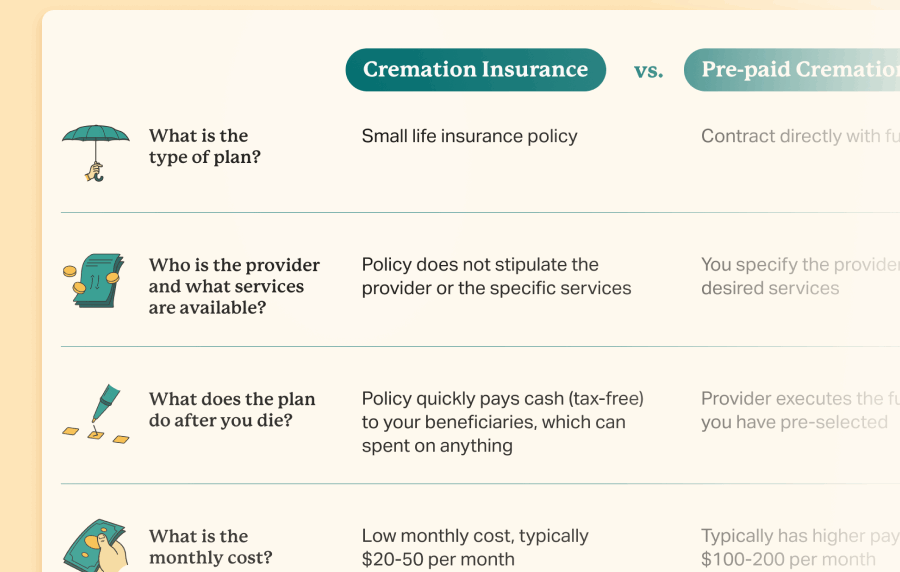No Exam Burial Insurance Options
There are two types of no exam burial policies:
- Simplified issue: There is no medical exam, but there are health questions to answer. Your eligibility and price depend on your prior health history. If approved, there is no waiting period, meaning you would be fully covered for natural or accidental death once your policy starts. Also, simplified issue policies have the lowest cost because the insurance company knows there is a high chance you won’t die soon.
- Guaranteed acceptance: There is no medical exam or health questions to answer. Your approval is guaranteed regardless of your pre-existing conditions. However, guaranteed issue final expense policies come with two significant drawbacks. First, they always have a two-year waiting period. Non-accidental death during the waiting period will only result in a refund of your premiums. You would have to live for more than two years before the insurance company would be willing to pay out the full death benefit. Secondly, these plans are typically the most expensive option. Because the insurance company knows nothing about your health, they must charge a higher price, given the increased risk.
Generally, most people can qualify for a simplified issue policy with no waiting period unless they have dire medical conditions such as dementia or a terminal illness.
Best No Exam Burial Insurance Companies
Dozens of funeral insurance companies offer no exam policies. There is no way to single out just one as the best option for every person. That’s because they all differ in price, coverage limits, terms, and conditions.
You must compare multiple providers side by side to find the best policy.
- $10K Policy Cost$41.01/month*
- New Applicant Ages45-85
- Death Benefit Options$2,000-$50,000
- 2-Year Waiting PeriodNo
- $10K Policy Cost$55.00/month*
- New Applicant Ages45-85
- Death Benefit Options$3,000-$25,000
- 2-Year Waiting PeriodYes
- $10K Policy Cost$47.60/month*
- New Applicant Ages40-89
- Death Benefit Options$2K-$25K
- 2-Year Waiting PeriodNo
How Much Does Final Expense Life Insurance With No Exam Cost?
The median cost of a no-exam final expense policy is $50-$100 monthly for a $10,000 death benefit. Your exact price will depend on various factors and the type of policy you seek. The pricing factors for each policy type are listed below.
- Simplified issue: Age, gender, state of residence, health, tobacco usage (if any), and how much coverage you choose.
- Guaranteed issue: Age, gender, state of residence, and the coverage amount.
What’s The Difference Between “No Medical Exam” And “No Health Questions”?
Any time you see a company promote a life insurance product with only the words “no-exam,” they are offering a simplified issue policy. There is no medical exam, but there are health questions.
Your acceptance is not guaranteed. Your eligibility would be based on your prior medical history.
Conversely, if you see a company advertise a plan with “no health questions,” that implies that your acceptance is guaranteed. There is no medical exam or health questionnaire to complete.
Policies with no health questions always (no exceptions) have a two-year waiting period. The insurer will only refund your money if you die during the waiting period.
One common final expense scam is when a company makes you believe they offer a policy with no health questions and no waiting period. They are hoping you’ll never read the policy to discover the truth.
Don’t let yourself fall victim to a scamming agent. You must answer health questions to get burial insurance with no waiting period.
Frequently Asked Questions
Burial insurance, commonly known as final expense or funeral insurance, is a type of whole life policy typically meant to cover end-of-life expenses. It’s still life insurance, meaning your beneficiaries will get a tax-free cash payout when you die.
Because insurance companies know these plans are usually for funeral costs, they pay out quickly, within 24-48 hours, once they have the necessary documentation.
The proceeds your loved ones receive can be spent on anything, including cremation costs, burial expenses, funeral services, debts, medical bills, or anything else. Any leftover funds are theirs to keep and use as they see fit.
Final expense insurance never requires a medical exam. Some policies have health questions, and some do not. Regardless of which one you choose, no exam will be required. For example, final expense insurance is a great option for those looking for no exam senior life insurance.
Some burial insurance policies have a waiting period, and some don’t. In short, any policy with no health questions and guaranteed approval will always have a two-year waiting period before you’re covered for natural causes of death. To get burial insurance with no waiting period, you don’t have to take a medical exam, but you’ll have to answer questions about health.
Guaranteed acceptance life insurance with no waiting period does not exist. If you buy a policy with no health questions, there will always be a two-year waiting period. The insurance company will only refund your premiums if you die during the waiting period. To get life or burial insurance with no waiting period, you don’t have to undergo a medical exam, but you must complete a questionnaire about your health.
Our Insurance Review Methodology
Every company we review has an overall score that illustrates how well it stands out in the market relative to its competitors. These scores are not subjective. Instead, we utilize a defined 5-star scoring system that applies a weighted average of particular factors, all of which are outlined below and on our review methodology page.
We measure the price of a company’s most popular they promote relative to its competitors. The closeness of their cost to other companies determines the final score. Read a full breakdown of the price of coverage factor on our review methodology page.
This factor assesses whether a company offers immediate coverage and, if so, how difficult it is to qualify for it. Read a full breakdown of the no waiting period coverage factor on our review methodology page.
A company’s financial strength is based on its rating with A.M. Best. Read a full breakdown of the financial strength factor on our review methodology page.
The National Association of Insurance Commissioners’ complaint index measures an insurer’s frequency of consumer complaints compared to the rest of the market. The score the insurer receives is based on how it stacks up to the median score of other insurers. Read a full breakdown of the NAIC complaint index factor on our review methodology page.
Why trust Choice Mutual?
When we review products, our findings are unbiased and free of any influence from partnerships or methods of compensation. All findings, good or bad, are solely the derivative of our objective analysis of any given product or company.
As noted on our review methodology page, our researchers evaluate the financial stability of the insurer, policy costs, product limitations, state availability, customer satisfaction, waiting periods (if applicable), and other relevant factors. We aggregate all this cumulative data to develop objective overall scores based on pre-defined weighted factors.
In addition, a qualified expert who is well-qualified to speak on the matter will provide opinion-based feedback about the company or product being reviewed.
For over a decade, Choice Mutual has been an insurance agency specializing in final expense life insurance. Our expertise in this type of insurance is well-documented in numerous authoritative publications, some of which are listed below:
Choice Mutual’s mission is to provide consumers with unbiased expert commentary and explanations of the topics being discussed. We want our readers to be armed with information and tools that cannot be found anywhere else on the internet, so they can truly make an informed decision.
All content on this website is written by Anthony Martin, who is a licensed life insurance agent with over a decade of expertise in this industry and has been quoted as an expert source hundreds of times by many reputable news outlets.
Per our editorial guidelines, we have never, and will never, use artificial intelligence to create our content. Every word printed on this website is produced and curated 100% by human beings who have firsthand experience with the subject matter.
- Nationally licensed life insurance agent with over 16 years of experience
- Personal annual production that puts him in the top .001% out of all life insurance agents in the nation.
Anthony Martin is a nationally licensed insurance expert with over 16 years of experience and has personally served over 10,000 clients with their life insurance needs. He frequently authors entrepreneurial and life insurance content for Forbes, Inc.com, Newsweek, Kiplinger, and Entreprenuer.com. Anthony has been consulted as an expert life insurance source for dozens of high-profile websites such as Forbes, Bankrate, Reuters, Fox Business, CNBC, Investopedia, Insurance.com, Yahoo Finance, and many more.
- Nationally licensed life insurance agent with over 20 years of experience
- Best selling Amazon author.
Jeff Root is a nationally licensed life insurance expert with over 20 years of experience. He has personally helped over 3000 clients with their life insurance needs. Jeff is a best-selling Amazon author and the managing partner of a highly successful insurance brokerage that manages over 2,500 licensed insurance agents across the USA. He has been a featured life insurance source for prestigious websites such as Forbes, Bloomberg, MarketWatch, Nerdwallet, and many more.
- Nationally licensed life insurance agent with over 15 years of experience
- Best selling Amazon author of five insurance sales books.
David Duford is a nationally licensed insurance expert with over 15 years of experience. He has personally helped more than 15,000 clients buy life insurance. David has been featured as an expert source for highly authoritative publications such as A.M. Best and Insurancenewsnet. He also runs one of the largest Youtube channels to help aspiring insurance agents serve their clients better.
- Nationally licensed life insurance agent with over 20 years of experience
- Best selling Amazon author.
Jeff Root is a nationally licensed life insurance expert with over 20 years of experience. He has personally helped over 3000 clients with their life insurance needs. Jeff is a best-selling Amazon author and the managing partner of a highly successful insurance brokerage that manages over 2,500 licensed insurance agents across the USA. He has been a featured life insurance source for prestigious websites such as Forbes, Bloomberg, MarketWatch, Nerdwallet, and many more.
- Nationally licensed life insurance agent with over 15 years of experience
- Best selling Amazon author of five insurance sales books.
David Duford is a nationally licensed insurance expert with over 15 years of experience. He has personally helped more than 15,000 clients buy life insurance. David has been featured as an expert source for highly authoritative publications such as A.M. Best and Insurancenewsnet. He also runs one of the largest Youtube channels to help aspiring insurance agents serve their clients better.












